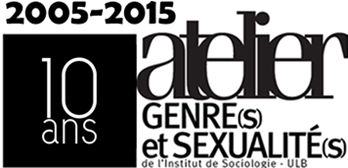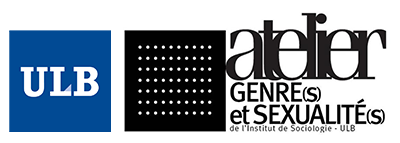Dans la même rubrique
- AGS
- FR
- Le Centre
- Archives de l'Atelier
- 2015
-
Partager cette page
The Past, the Present and the Future of Sexual Revolution
31 mars

Special Session at the Universiteit Antwerpen
Discussion of the edited volumes Sexual Revolutions (Palgrave 2014) and Révolutions sexuelles (La Musardine 2015).
With the editors, Gert Hekma (Universiteit van Amsterdam) and Alain Giami (INSERM, Paris), Irène Kaufer and Bart Eeckhout (Universiteit Antwerpen). Introduction by Wannes Dupont (Universiteit Antwerpen).
In collaboration with the History Department of the Universiteit Antwerpen and Polhis - Centre for Political History.
Abstract
The introduction to the recent edited volume Sexual Revolutions ends with the editors claiming that sexual liberation is still “worth fighting for”. But many of the contributions that follow this introduction complicate any unambiguous idea of what such a liberation or revolution has comprised in the past and what it might entail in the future.
Moreover, it is clear from the introduction itself that the events of the 1950s, 60s and 70s have produced mixed results about which there is considerable skepticism among scholars, activists and members of the public alike. The mayor of Antwerp, for instance, has railed against what he called the “ravage” caused by the sexual revolution of that period.
At the risk of generalising too much, it could be argued that one of the main outcomes of the sexual revolution has been the ascendancy of a new normative model with regards to sex in a wide range of countries. Where, until the 1960s, ‘good’ sex was confined to married life and aimed at reproduction (in theory, if not in practice), the notion of consensus-based (and usually non-violent) liberalism has prevailed since then.
Current debates about sexuality are most often concerned with either refining this consensus-based model, or with the conservative forms of resistance to it. So, is a refined consensus-based liberal model the end of sexual history? Or is it just the current horizon of our thinking? What, in other words, are our options, and what might the next revolutionary model look like? How could, for example, children’s sexuality or the sexuality of the mentally disabled help us to think beyond our current model? And should they?
Biographies
Alain Giami is Research Director at INSERM in Paris, where he coordinates a team on sexuality, gender, medecine and sexology. He has published several books, including Sexual revolutions (Palgrave 2014. Published in French at la Musardine in 2015, edited with Gert Hekma), Des sexualités et des handicaps: Questions d'intimité (Presses Universitaires de Lorraine 2013, with Bruno Py and Anne Marie Toniolo), L’expérience de la sexualité chez de jeunes adultes (Inserm 2004, with Marie-Ange Schiltz), L’Ange et la Bête (1983, 2001). He is also the author of about 100 scientific articles. He is currently supervising an international research programme on trans people (France, Brasil, Italy) as well as a project on the transformation of sexology into sexual medecine.
Gert Hekma teaches sexuality & gender studies at the Department of Sociology and Anthropology, University of Amsterdam. His research focuses on the sociology and history of homo/sexuality. He wrote numerous articles on those subjects and co-edited with Kent Gerard The Pursuit of Sodomy (1989), with Harry Oosterhuis and James D. Steakley Gay Men and the Sexual History of the Political Left (1995), with Franz Eder and Lesley Hall Sexual Cultures in Europe (2 volumes, 1999), with Alain Giami Sexual Revolutions (2014) and edited A Cultural History of Sexuality in the Modern Age (2011). He published in Dutch Homoseksualiteit in Nederland van 1730 tot de moderne tijd (2004) and ABC van perversies (2009) which will be published in English (2015). He contributed to Gewoon doen (2006) and Steeds gewoner, nooit gewoon (2010), reports on acceptance of homosexuality in The Netherlands.
Born in Poland, Irène Kaufer arrived in Belgium with the 1958 World Exhibition. Early feminist and lesbian activists (from the 1970s), she has worked among others for Garance, an organisation which prevents gender-based violence. She belongs to the editorial board of the journal Politique and regularly contributes to Axelle (Vie Féminine). In 2005, she published a book in which she interviewed the Belgian feminist philosopher Françoise Collin, Parcours féministe (Labor. Republished by iXe in 2014). Déserteuses, which gathers her novels, will be published in 2015 (Academia L’Harmattan-Belgique).
Bart Eeckhout is Professor of English and American Literature at the University of Antwerp, Belgium, and a leading activist in the Flemish-Belgian LGBT movement. He has degrees from Ghent University and Columbia University and has been a visiting faculty member of Fordham University and New York University. An expert in the modernist poetry of Wallace Stevens and Editor of The Wallace Stevens Journal, Eeckhout also specializes in urban studies and in LGBT/queer studies. At the University of Antwerp, he teaches courses in queer fiction and queer studies and supervises various doctoral dissertations in the field. Some of his work in queer studies derives from his activism: currently, Eeckhout is chair of the Board of Directors of the Flemish umbrella organization çavaria.
A few publications have emerged directly out of his collaboration with other activists, such as Paul Borghs for an article in International Journal of Law, Policy and the Family. With David Paternotte, Eeckhout published on the Belgian situation in Journal of Homosexuality, and individually in a volume called Queer in Europe. Other queer work of his is forthcoming in a book on queer London (for Bloomsbury), a handbook on American studies (for Routledge), and in Journal of the Short Story in English.
